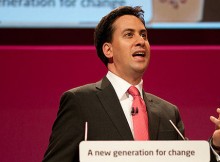Pitting leaders against each other on the idiot box will make us less informed.
Political TV debates were for decades derided as a crass Americanisms before they took place ahead of Britain’s 2010 general election.
Now it seems they have become a permanent fixture, or at least one that many are anxious to repeat as we enter the last month of the coalition government, and the last two months before the country goes to the polls.
Writing on the Electoral Reform Society’s blog, the lobby group’s comms guy Josiah Mortimer says:
As we near the election, the time for negotiation is (thankfully!) over. These debates should go on as planned, with no excuses and no backing out. To opt out and deny the public a chance to hear party leaders’ views before the election would be an insult to democracy.
There’s no doubt that the organisational “mess” Mortimer describes has much to do with the electoral prospects of Tory prime minister David Cameron. His opposition to the debates may be cynical, but politicians can rarely afford to be generous with their campaign strategies, so his behaviour is unsurprising.
What is less obvious is whether cancelling a television debate would actually be an “insult to democracy”, or at least any more of an insult than holding them in the first place.
Years ago there was much harrumphing over the idea that cameras be placed inside the House of Commons so the public could see directly into the country’s chief legislative chamber, a squabble that was repeated when journalist Michael Cockerell applied to film his latest series Inside the Commons.
British courts, unlike their Stateside counterparts, still do not allow filming, as it is felt this would impugn the dignity of the proceedings. The argument is made that lawyers would play to the cameras rather than the jury or even the gallery, a view that prime minister’s questions proves astute every week.
Yet the real problem is not so much about how the material is produced as how it is consumed, as evinced by compilation clips of athlete Oscar Pistorius’ trial, which tended to focus on him vomiting into a bucket or receiving a scolding interrogation from prosecutor Gerrie Nel.
Just as with other celebrity trials, such recordings are used primarily to entertain rather than inform the viewer — exactly the reverse of the correct priorities.
Whilst political debates shown on TV will be highly accessible and perhaps even amusing as a sparring contest, for the same reason they will fail to enlighten the viewer on even the most cursory details of what is being discussed.
The logic was long ago espoused by Neil Postman, whose 1985 book Amusing Ourselves to Death details in some depth the unsuitability of the televisual medium to serious discourse:
For on television , discourse is conducted largely through visual imagery, which is to say that television gives us a conversation in images, not words. The emergence of the image-manager in the political arena and the concomitant decline of the speech writer attest to the fact that television demands a different kind of content from other media. You cannot do political philosophy on television. Its form works against the content.
This is not to say nothing worthwhile can be gleaned from TV, and indeed there are many good programmes that attest otherwise. But any politically minded viewer that has seen Question Time, The Big Questions and similar shows would have to agree that the educational value of primetime “debate” TV is tenuous if it exists at all.
Today’s politicians are well aware of the omnipresent journalistic fishing for soundbites that can be repackaged into easily digestible nuggets for the busy citizen to wolf down between slices of Match of the Day and EastEnders or BuzzFeed and PornHub.
This makes Mortimer’s view of the debates as an “opportunity to hold the main party leaders to account” exactly wrong. Rather it is a chance to present an illusion of involvement in the decisions that politicians will make once the ballots are cast — and a rotten con.
Picture – Ed Miliband.
